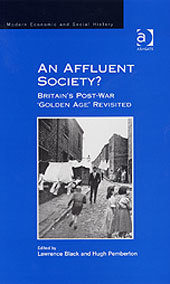An Affluent Society? Britain's Post-War 'Golden Age' Revisited Modern Economic and Social History Series
Auteurs : Black Lawrence, Pemberton Hugh

Date de parution : 06-2004
15.6x23.4 cm
Date de parution : 05-2017
15.6x23.4 cm
Thèmes d’An Affluent Society? :
Mots-clés :
West Germany; relative; Young Man; economic; Pop Stars; decline; Gold Fish; Hugh Pemberton; Good Life; Brian Girvin; Britain’s Relative Economic Decline; Rodney Lowe; Contemporary Society; Richard Toye; Nuclear Disarmament; Catherine Ellis; Tv Violence; Roger Middleton; UK Advert; Matthew Hilton; IMF Crisis; Lesley Whitworth; UK Factory; Christian Bugge; Good Filing System; Richard Weight; Real Gdp; Tv Sex; UK Growth; Birmingham Group; Britain’s Relative Decline; National Solvency; Douglas Jay; Youth Subcultures; Popular Affluence; Youth Marketing; Voluntary Incomes Policy



